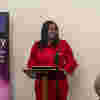What is the role of artificial intelligence in supporting blind and vision impaired people in the workplace?
Our Westminster event brings together VI leaders, the technology sector, and politicians to discuss what can deliver a step change in getting people with vision impairments (VI) and those who are blind into employment.
However, to be successful, vision-impaired leaders, the sector, and government will need to work together.
Under the banner of Vis-Ability, an event hosted by Marsha de Cordova MP and Fight for Sight brought together over 140 influential leaders and allies to discuss how blind and vision-impaired people can make the most of artificial intelligence (AI).

While we now have the technology we need, it’s clear that barriers remain. It’s essential that the public sector, private providers, and advocacy groups work together and in partnership with individuals living with vision loss to overcome these barriers and create meaningful change.’
“Only by working together will we harness the power of artificial intelligence for the blind and vision impaired community.”
That was the message at a Parliamentary event, which saw vision-impaired (VI) leaders, politicians, and technology leaders coming together.
A panel chaired by Gareth Ford Williams debated the role of AI in transforming lives. It featured VI leaders Neil Heslop OBE, Léonie Watson, and Alison McGovern MP, the Minister for Employment.
Vis-Ability is an annual opportunity for VI leaders to debate and influence hot topics.
Marsha de Cordova, Battersea MP and Chair of the All-Party Parliamentary Group for Eye Health and Visual Impairment said: “I was delighted to host Vis-Ability in Parliament and drive forward the discussion on how we can collectively harness the power of AI to enable visually impaired people to thrive.
“While we now have the technology we need, it’s clear that barriers remain. It’s essential that the public sector, private providers, and advocacy groups work together and in partnership with individuals living with vision loss to overcome these barriers and create meaningful change.’’
Among the tools demonstrated were Meta’s Ray-Ban smart glasses, integrated with the Be My Eyes app, which enables blind users to access visual information hands-free – from reading a document to navigating an office.
The event also reinforced that many people continue to rely on other forms of assistive technology and that accessibility must remain diverse, affordable, and user-led.
Co-host Keith Valentine, CEO of Fight for Sight, said: “The advent of artificial intelligence is revolutionizing the experiences of people who are blind and VI. It was great to see so many people exploring Meta and Be My Eyes on the evening. For me, the glasses have improved my independence, but they are just one tool in our arsenal.
“As powerful as the technology is, however, it’s the conversations we have now that ensure everyone has the same opportunities, including access to technology, regardless of vision loss.”

As powerful as the technology is, however, it’s the conversations we have now that ensure everyone has the same opportunities, including access to technology, regardless of vision loss
A spirited debate
Access to technology can unlock confidence, independence and opportunity. Zaynab, for example, uses technology tools from a Braille reader to AI apps. And she uses ChatGPT to help get around.
“I use it [ChatGPT] to plan routes [because] I use a lot of Ubers. Being able to be dropped off safely is an issue. I've been using ChatGPT to ask for a layout of a specific place. AI has been revolutionary. I think there's so much potential for it to develop even more.”
Darren Paskell, who works for Guide Dogs, has been passionate about using and improving accessible technology for people who are blind ever since he first learned to touch type at primary school.
“Accessible technology makes all the difference. Tools like screen readers, magnification software, and AI open up possibilities that simply didn’t exist before. It’s not just about using a computer — it’s about connecting with the world and taking control of my independence.”
Related content




